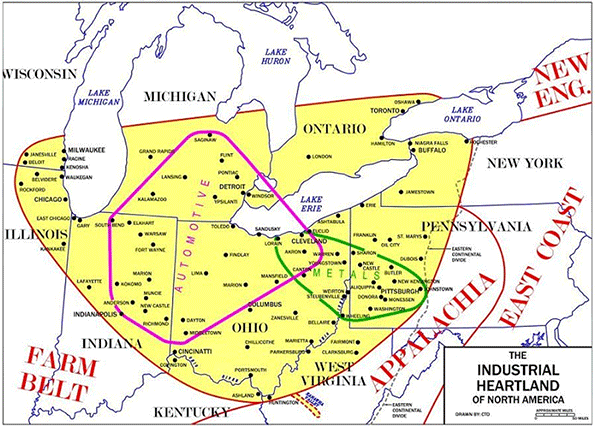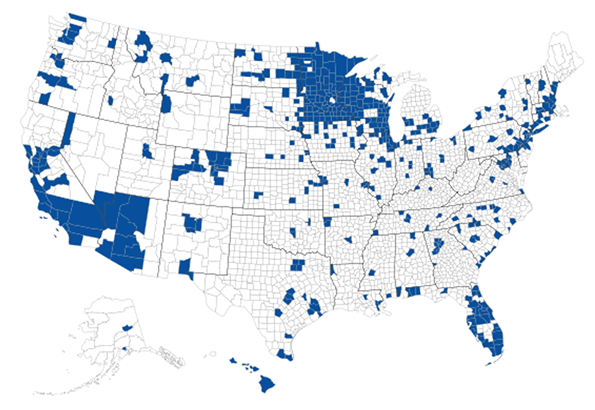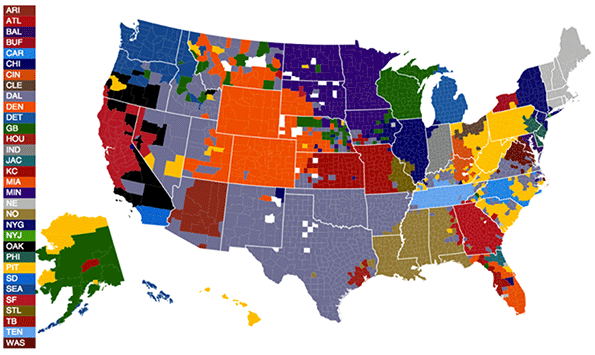
There’s been a lot of discussion in Minneapolis-St. Paul about whether they should try to dissociate themselves from the Midwest by rebranding themselves as the Capital of the North.
This immediately raises three questions:
- Is “The North” really a distinct region?
- Are the Twin Cities the capital of it?
- Is branding the Twin Cities as “the Capital of the North” a good idea and likely to succeed?
What Is “The North”?
Is the North a distinct region from the Midwest? While popular maps of the nine (or eleven) nations of North American don’t include a cohesive North region, there are some reasons that suggest so. The areas of northern Wisconsin, the Upper Peninsula of Michigan, the Dakotas, etc. were more sparsely populated than the rest of the Midwest. They also had a different economic structure.

This map highlights the area whose economy was driven by heavy industry and manufacturing. Most of the North was outside of this zone. The economy of that area was more dependent on natural resources (mining, such as copper in Michigan’s Upper Peninsula), farming, and grain processing. Fracking for oil in North Dakota is a continuation of this resource based economic heritage.
The area is also demographically distinct. It was more heavily settled from northern Europe, notably Scandinavia, versus the Eastern European influence felt elsewhere. The Great Migration of blacks to the industrial north also had much less of an effect on this area, which was historically very white, and still is less diverse than the rest of the country.
Climatically, the North, as the name implies, is the coldest region of the continental United States.
So there are some attributes of this region that do set it apart from the rest of the Midwest.
Are the Twin Cities that Capital of the North?
Where the capital idea doesn’t hold up is in looking at contemporary migration. The map below shades in blue any county that had people move to or from Minneapolis’ Hennepin County between 2001 and 2011, using IRS tax return data:

Outside of Minnesota itself, the only place in the North of which the Twin Cities are the capital from a migration perspective is part of Wisconsin.
Are there other areas where the Twin Cities look more like a capital? One of them would be sports fandom. Here’s a map of football team spheres of influence based on the number of Facebook “likes.”

Here the Minnesota Vikings get no love in Wisconsin, which is owned by the Packers. But the Vikings do have strong followings in much of Iowa and the Dakotas, which fits well to a concept of the North.
The area encompassed by the North is for the most part sparsely populated, with the Twin Cities being the only major urban area (more than a million people) for quite a distance. The closest other city of that size is Milwaukee, about 300 miles away. Minneapolis-St. Paul is about as far away from Chicago as Kansas City. This by itself creates a sort of capital effect, as there is a pretty large swath of territory which logically looks to the Twin Cities for big city amenities and attributes. Pro sports would definitely fall into this category. So perhaps there is some level of “capital” attribute here.
Should the Twin Cities Brand Themselves As the Capital of the North?
If there is conceivably a North and the Twin Cities can potentially claim be or push to develop itself as the capital of this region, is that the best way to brand itself?
There are two basic approaches cities are pursuing today. One is the regional capital approach of a Barcelona. (It would perhaps like to see itself as a national capital). The other is the global city approach of Chicago in which the city seeks to brand itself as a stand alone entity directly in the marketplace while actively divorcing itself from the region.
The global city model seems more popular at present. In Chicago’s case it’s easy to understand why; the Midwestern Rust Belt has struggled so why hitch yourself to that wagon? This has had some good success and Chicago’s brand image is strong. The challenge for Chicago is that its wagon is economically hitched to the Midwest whether it wants it to be or not, at least to some extent. Chicago is the business services, tourism, etc. capital of the Midwest. The struggles of that region explain a chunk of that city’s now well-publicized travails. Chicago’s fiscal weakness, inequality, etc. problems would likely be less if it were in the middle of a booming region.
So if the Twin Cities are functionally a capital, this regional relationship will assert itself organically, however it seeks to brand itself.
Where the branding idea falls flat is in two areas. First, unlike Catalonia, the North isn’t an area with any sort of existing public resonance. Thus the Twin Cities would have to create a brand not just for itself – where they already feel they have weaker marketplace awareness – but also for the North itself, which is presently non-existent. This just makes things harder.
The second is the cultural disconnect between the Twin Cities and the rest of the North. Yes, one can look to Madison, Wisconsin (which probably more connected to Chicago in any case) as sympatico. But the rest of the North seems quite different. Don’t forget, there are a lot of Republican voters in Minnesota. The state had a very conservative Republican governor in Tim Pawlenty until recently. Can the Twin Cities embrace them? Natural resources has always played a key role in the North – 3M is Minnesota Mining and Manufacturing, don’t forget. Can the Twin Cities embrace the North Dakota fracking boom as its own?
Color me skeptical. Given our politically polarized environment, the time does not seem ripe for a city to actively embrace its hinterland, and the politics and economic activity it contains. That’s not to say it shouldn’t. America needs more bridge building than ever, not just politically, but between large urban and small urban and rural areas. But I don’t think it likely a region that prides itself on progressivism (e.g., environmentalism) and is already concerned about its standing in elite circles is ready to take that step.
Aaron M. Renn is a senior fellow at the Manhattan Institute and a Contributing Editor at City Journal. He writes at The Urbanophile.
"Minneapolis on Mississippi River" by Jdkoenig - Own work. Licensed under Public Domain via Wikimedia Commons.












